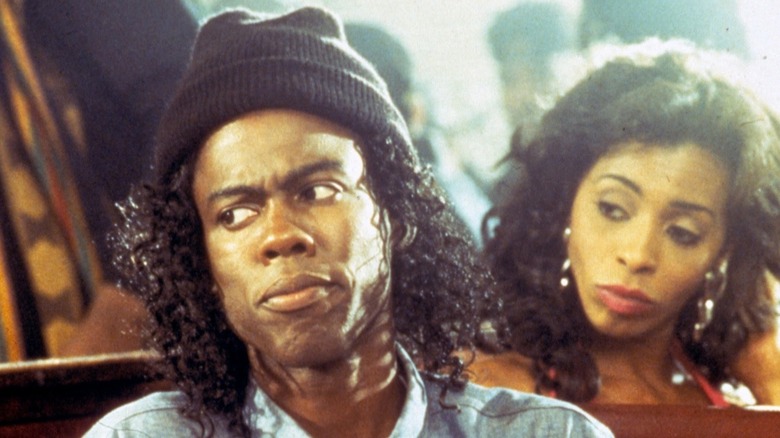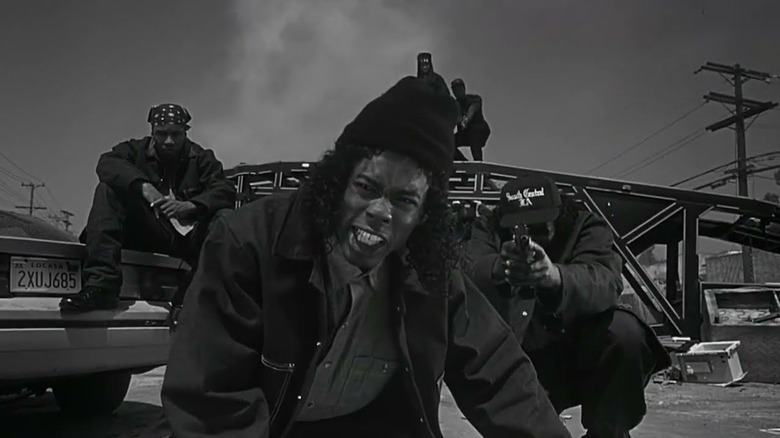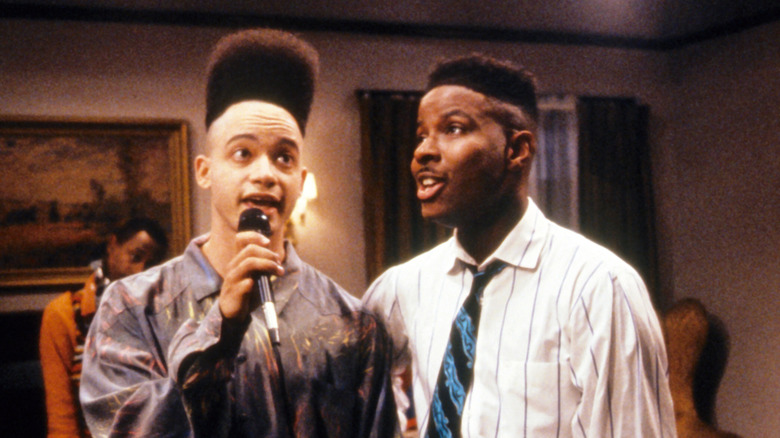Chris Rock Considers CB4 To Be 'The First Good Rap Movie'
If you're looking to pinpoint the greatest year in hip-hop, it's going to start with a one, followed by a nine, another nine, and end with a number no higher than five. The genre that grew out of Bronx house parties thrown by sonic pioneers like DJ Kool Herc, and survived the faddish exploitation of the early and mid-1980s had finally come of age. Obviously, there were groundbreaking LPs released prior to the '90s, but it wasn't until we entered the final decade of the millennium that explorers like Hank Shocklee, Dr. Dre, DJ Premier, and Prince Paul refined their sounds to bring hard-hitting East Coast beats and blunted West Coast G-funk grooves to the ears of audiophiles across the country.
Hollywood was listening. They weren't necessarily getting it, but they were listening. Mid-'80s films like "Breakin'," "Beat Street" and "Krush Groove" captured the excitement of the burgeoning hip-hop scene to such an ecstatic extent that you could almost excuse their cliché-ridden storytelling. But when the music really took off in 1986, due primarily to the multi-platinum success of Run-D.M.C.'s "Raising Hell" and The Beastie Boys' "License to Ill," studios trivialized the genre by turning The Fat Boys into a kinder, gentler Three Stooges via "Disorderlies," and allowed producer Rick Rubin to direct Run-D.M.C. in the dire vigilante film "Tougher Than Leather."
Hollywood finally harnessed rap's spiking popularity with cautionary urban dramas ("Boyz n the Hood" and "Menace II Society") and savvily modernized Blaxploitation flicks ("New Jack City" and "Deep Cover"). But while hip-hop lent these movies a swaggering authenticity, none of them were about the actual music — which felt like a missed opportunity. So it was both overdue and kind of odd that the first true rap movie to hit the multiplexes in the early-'90s was Chris Rock's parody "CB4."
A rap parody coming straight outta Locash
Released in early 1993, "CB4" was both a perfectly timed satire of the genre's excesses and an affectionate celebration of its barely-two-decade history. It kicks off with a montage of hip-hop artifacts set to Doug E. Fresh's ebullient classic "The Show," then gets to lampooning the suburban-kids-turned-gangstas arc followed by more than a few hip-hop stars. It's about being hard, and how confusing the act with reality got more than a few artists in too deep with real-deal gang members. It also ignores the fact that some of these artists weren't suburban brats like Rock's character, but the first movie to be explicitly about rap couldn't possibly be all things to all people.
In a 1993 interview with Spin, Rock, who wrote the film with esteemed cultural critic Nelson George and Robert LoCash, said he was proud of the film's authenticity.
"All the rap stuff is there ... You got the female reporters: 'Why do you call women b***hes and hos?' Phil Hartman plays this politician who's trying to outlaw the group. You got one scene where a bunch of dancers — girls from videos — are talking, and one says, 'You know my left tit was prominently featured in Eric B's last video.' I think it's the first good rap movie."
As a massive hip-hop fan who came of age during the music's ascendance, I'd say, on a surface level (which, as a kid from a small, very white Ohio town, is all I'm qualified to judge), that it effectively spoofs the genre's tendency towards misogyny and flash-in-the-pan novelty. CB4's trial-and-error phase at a local club ("We're The Bag Heads!") is outrageously funny, as is the trio's post-breakup attempts at solo success ("I'm black, y'all!"). And Lance Crouther trying to beat money out of a dead Willard E. Pugh in his coffin may be the most randomly hilarious thing I've ever seen.
Reginald Hudlin threw a superior hip-hop party
"CB4" is, like most parodies of this nature, hit-or-miss, but the hits are more than worth it. But as for whether it's the first good rap movie, there was one before it that genuinely, good-naturedly conveyed the roof-is-on-fire joy of emceeing.
For a film that spawned two theatrical sequels and one buried-by-its-distributor remake, Reginald Hudlin's "House Party" does not get the love it deserves — by which I mean it belongs in teen comedy pantheon with "American Graffiti" and "Dazed and Confused." The hip-hop duo Kid 'n Play (Christophers Reid and Martin) were the feel-good flipside to the cynically packaged likes of MC Hammer and Vanilla Ice. They know how to put on a show, and they do so without sacrificing the integrity of a burgeoning culture that's ever mindful of its underground roots.
There's a fabulous dance-off between our protagonists and the girls they fancy (Tisha Campbell and A.J. Johnson), a freestyle battle and so much good music. The laughs are supplied by a young Martin Lawrence and two dearly missed greats in Robin Harris and John Witherspoon. It zips by at 100 minutes and is absolutely unbeatable as a comfort-food movie.
But most of all, it's a 1990 snapshot of rap at the moment its finest artists were getting beamed into living rooms by "Yo! MTV Raps." There was no real filter. Acts that would never get rotation on Top 40 radio (e.g. Gang Starr, NWA, and Main Source) found fans in towns they'd never know to tour. The audience diversified, and, for a brief period, major labels left the emcees and their producers alone. "House Party" celebrates the glory of what once was, while "CB4" satirizes how it would all get homogenized to hell. I enjoy the latter, but I'd rather get lost in the former.


